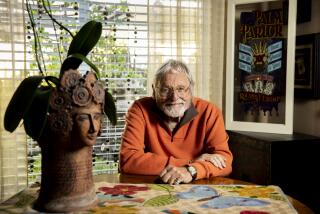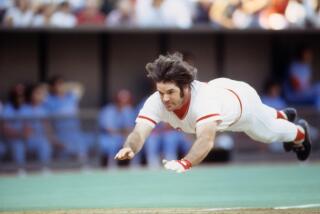The Ride of His Life : Willie Ross lives in a mysterious world of silence. But his parents know what truly excites him: Limos.
Bobby and Gene “Bud” Ross watch their son Willie shift his attention from a magazine to the overhead lights as he awaits his turn at the Palisades Barber Shop. He closes one eye and raises a hand, gazing in silence at its mysterious ballet of slow, flowing movements.
They watch as Willie steps into John Barrowman’s chair without being told. As a teenager, Willie would thrash violently, and it would take the strength of both of them to hold him still.
So often during Willie’s life, their strength has been tested.
In 1964, the same year Bobby’s oldest son from a previous marriage walked up to their back door in Longmeadow, Mass., complaining of a rash, a doctor confirmed that she was pregnant. It was in the midst of an outbreak of rubella, commonly known as the German measles.
Bobby and a second son also fell ill. They were among 12.5 million rubella cases reported during the outbreak. And Willie, born on Valentine’s Day of 1965, was one of 20,000 children born during the outbreak with congenital rubella syndrome, according to the records of the Centers for Disease Control and Prevention.
Of those 20,000 babies born of mothers who contracted rubella during their first trimester, 11,600 were born deaf, 1,800 were developmentally disabled. Willie was both.
Through meticulous notes that Bobby keeps in her journal, she recalls how in August of 1981, when Willie was 17, there was a transient pause as he sat motionless in Barrowman’s chair; and she thought to herself, “Just look at him. He looks so handsome and grown up. So normal.”
Willie is 30 now. He has made small strides over giant hurdles. He has learned a sketchy vocabulary through gestures and sign language, words and phrases but not complete sentences.
For the most part, Willie’s life of silence is a mystery. He cannot fully understand our world as we cannot understand his, creating a void through which no passage has been found.
Still, inferences can be made based on his behavior, and that is how his parents know that one thing that truly excites him, that causes him to stand on his toes and thrust out his chest, raise his head and breathe heavily until he breaks out in a sweat . . . is limousines.
It has been that way since he was a child.
Toys or cartoons didn’t interest him, but for unknown reasons limos did. Since 1982, his parents have rented him a limo for his birthday, for each celebration of his life.
Late last year an advertisement for the 12th annual Limousine & Chauffeur Show in Las Vegas caught Bobby’s glance. She decided to send Willie, even though it was a week before his birthday.
But first he needs a haircut.
*
From a hill near their home in Pacific Palisades, you can see Catalina Island, Los Angeles International Airport, downtown L.A.--all of which are hidden by clouds as Bud and Willie, with neatly trimmed hair, quietly walk their familiar route.
It remains a special moment between father and son. After Willie had surgery to lengthen his Achilles’ tendons to prevent him from walking tip-toed, Bud pushed him up this hill in a wheelchair.
Willie walks stiffly, unlike the graceful strides he showed as a youngster running on the beach. But the feeling of movement enthralls him--standing on a pier and watching the tide, feeling the wooden planks tremble beneath him, riding roller coasters, forcefully slamming doors to feel the vibration.
In addition to being hearing impaired and developmentally disabled, he is legally blind and wears thick glasses. He examines the world largely through smell, touch and taste.
He pinches off bits of flowers and shrubs that line the street, lifting them to his nose then tossing them over a shoulder. Geraniums powder the air with their distinct scent. It is quiet except for birds and footsteps that Willie cannot hear.
Bud explains how since 1965 their lives have become a search for answers and for a place in life for Willie, one of their four sons. They searched for doctors and dentists, churches and restaurants, a barber who would not turn them away because of Willie’s disruptive behavior.
When they couldn’t find a program meeting the needs of hearing-impaired children, they helped start one in a church basement. The Willie Ross School for the Deaf in Longmeadow now is in its 29th year.
Shortly after the school opened, however, the family moved to Southern California, where they had once lived. Experts here told them that Willie could hear, that Willie could not hear, that he was autistic, that he was not.
All the while, the Rosses struggled to contain a child who was hammering fists into his head up to 400 times a day, thrusting his chin into his shoulders until they were bruised.
Bobby spoke out in support of a program that utilized aversive treatment, imposing physical consequences to eliminate self-abusive behavior. Over time, however, the consequences of the program became too much. It took more than saying, “no,” more than a water squirt in the face, more than a pinch. Later, they discovered that one day Willie had been spanked 175 times.
They pulled him out of the program and vowed to start their own. In 1984, the nonprofit Foundation for Developmentally Disabled Inc. (FDD) opened the first group home in the Los Angeles area designed for people who were both hearing impaired and developmentally disabled. Located in Woodland Hills, it houses six men, four of whom are disabled because of rubella.
Every six weeks or so, Willie returns to his parents’ house for the weekend, and as often as they can, father and son hike up this hill. At the top, the two men hug, and Bud gives Willie a kiss before they turn and make their way back down.
Bud is 74 years old and works as a college recruiter as manager of campus relations for Bullock’s/Macy’s, a job he loves. He is the source of quiet strength for Bobby, who has plowed ahead in life, sticking one foot out and believing there will always be another step to move them forward.
Together, they found their way through Bobby’s alcoholism. She hasn’t had a drink since 1970. They moved forward through a private plane crash that their two oldest sons miraculously survived, through the constant and repeated barriers they faced with Willie.
In all ways but one, it is a peaceful time in their lives. Four years ago, Bud was found to have prostate cancer. He has endured 33 radiation treatments and two surgeries.
“My attitude is that I’m going on 75, and I think anything over 70 are bonus years, so I’ll just take it as it comes. My life is very good right now.”
There is an air of contentment, of inner peace and quiet resolve in his voice. Perhaps it is faith. As Willie usually does, he beats his father to the front door as their walk together draws to an end.
*
RoxAnna Liston pulls up to the Las Vegas airport in a sleek white limo. Willie does his thing, lifting himself to his tip-toes, breathing hard as though gasping for air. Liston has driven for the stars: Marilu Henner, Jane Seymour, Billy Joel’s luggage. And now it is Willie’s turn.
He slides across the seat, locks the door. J.R. Doty, a house parent at FDD, climbs in next to him. Liston gives Willie a tour of the strip, and he breaks into a sweat as the Vegas lights reflect like fire off his face.
The first two people in line at the limo show at the MGM Grand the following morning are Willie and J.R. The doors open and J.R. leads Willie inside, where Willie sees the scope of his surprise birthday gift. They are greeted by a tantara of bright lights, dancing fancifully upon the polished chrome of a city of limos on the floor of the arena.
The routine is the same: From one limo to another, Willie climbs in through the open door, slides across the rich leather seat and sits. He doesn’t seem interested in the televisions or telephones, aquariums, chilled champagne and racks of crystal.
He touches the dark tinted windows and the soft leather. Each time, he seems to wonder why the limo isn’t departing.
Sales reps watch him between sips of coffee and bites of bagel.
Sometimes he crosses his legs, sometimes he sits and watches the motion of his hands. When he is ready, he slides across the seat and climbs back out, slamming the door hard behind him. Sometimes he breaks out laughing.
“He’s in seventh heaven,” J.R. says. “If only I knew what it was like to be Willie for a day.”
After the show, J.R. weaves Willie past the cool, hunched-over blackjack players, steely-eyed security guards and high-heeled cocktail waitresses to the banks of slot machines, where Willie pulls down 50 cents in nickels on his third try. Mana from MGM. He is more intrigued by dropping coins into the slots than whatever follows.
On the plane ride back, the moon, low in the sky, gives off an orange glow like the city beneath it. Willie seems tired, full from the feast. The speed of takeoff excites him, but his attention quickly turns to his left hand, raised in front of his face, his fingers turning and twisting in slow, graceful swirls.
More to Read
Sign up for Essential California
The most important California stories and recommendations in your inbox every morning.
You may occasionally receive promotional content from the Los Angeles Times.










